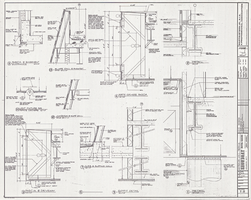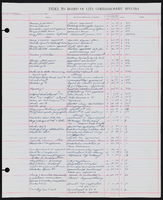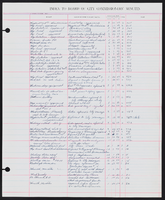Search the Special Collections and Archives Portal
Search Results

Architectural drawing of the Showboat Hotel and Casino (Atlantic City), exterior wall details, porte-cochère, 1985
Date
1985
Archival Collection
Description
Plans for the construction of the Showboat Hotel Casino in Atlantic City from 1985. Parchment copy.
Site Name: Showboat Hotel and Casino (Atlantic City)
Address: 801 Boardwalk, Atlantic City, NJ
Image

Transcript of interview with Ralph Daly by Charles Malkowski, February 25, 1977
Date
1977-02-25
Archival Collection
Description
Charles Malkowski interviews Ralph Daly (born in Texas in 1903) about his experience of moving to Las Vegas during its early growth. Daly talks specifically about Block 16 and the Arizona Club and the extent of gambling and prostitution that took place there in the early 1900s. Daly, who worked in oil fields but became paralyzed due to an injury, also talks about moving to Las Vegas to make his living on gambling after becoming disabled. He also describes how the construction of Boulder Dam attracted many migrant workers and how, after World War II, Las Vegas attracted tourists and became more of a gambling town as more casinos were built and worldwide advertising for those casinos started. Daly also discusses the end of prostitution in Las Vegas, certain famous gamblers he met, and the forms of cooling used before air conditioning was introduced.
Text

Transcript of interview with Richard Caldwell F. Sr. by Melvin Thompson, March 11, 1981
Date
1981-03-11
Archival Collection
Description
On March 11, 1981, Melvin Thompson interviewed Richard F. Caldwell Sr. (b. 1919 in New Orleans, Louisiana) about his experiences living in Las Vegas, Nevada for over 49 years. The interview begins with Caldwell discussing his family and what brought him to Las Vegas. He then talks about working at the Nevada Test Site, the hotels and casinos that were built on the Strip, his experience working at some of those properties, and the way of life in Las Vegas in the 1940s and 1950s. The two also discuss politics, religion, and recreational gambling in the city. The interview finalizes with Caldwell’s account of the Westside of Las Vegas, African American entertainers who came to town to perform, and a brief mention of many specific historical sites in the city.
Text

Transcript of interview with Chet Carrigan by Robert Kahre, February 17, 1981
Date
1981-02-17
Archival Collection
Description
On February 17, 1981, Robert Kahre interviewed Chet Carrigan (born 1912 in Texas) about his experience living in Las Vegas, Nevada. Carrigan first talks about his background in construction as well as some of his experiences in the Sheriff’s Posse before describing the major events and changes of Las Vegas that he witnessed. Carrigan also talks about his family, the effects of the Great Depression on the city, the flooding problem, and the building of Hoover Dam. He also describes the first schools in Las Vegas, means of transportation, his laundry business, and his experience on the volunteer fire department. The end of the interview involves a discussion of topics including the first movie theaters, Cashman Field, underground water, the railroads, and Carrigan’s thoughts on the future of Las Vegas.
Text

Transcript of interview with Helen M. Clark by Danny Winegar, March 5, 1979
Date
1979-03-05
Archival Collection
Description
On March 5, 1979, Danny Winegar interviewed Helen M. Clark (born 1921 in Memphis, Tennessee) about her experiences in Nevada. Clark first describes why she and her family moved to Las Vegas and then explains why she was homeschooled. She then talks about her secretarial work for a prominent real estate agent in Las Vegas and some of her work in that field. Clark also discusses the beginning of tract home building, gambling, and the building of Hoover Dam. She also mentions life during the Great Depression, prostitution in Block 16, and the Helldorado celebration. The interview concludes with Clark’s recollection of the first hotels and casinos that were built on the Strip, including those who built them and the mob influence over them, and a brief mentioning of her experience as a real estate agent.
Text

Transcript of interview with Joseph Delaney by Carol Hunter, October 24, 1979
Date
1979-10-24
Archival Collection
Description
Carol Hunter interviewed columnist and former music consultant Joseph “Joe” Delaney (b. 1922 in Philadelphia, Pennsylvania) on October 24, 1979 about his experiences in the entertainment industry of Las Vegas, Nevada. The interview begins with Delaney’s recollection of how Las Vegas looked when he first moved to the city in 1961. Delaney mentions some of the businesses and hotels that were popular at the time, including the entertainers that performed at many of those hotels. He then describes the evolution of piano bars to lounge acts to showroom performances in the hotels, as well as the types of changes made for admission to those performances as corporations took control over Strip properties. Delaney also provides insight into the intricacies of the agreements between the properties and various entertainers for their residencies, and he mentions many of the particular entertainers of the time throughout the interview. Delaney additionally discusses his original experiences in talk
Text

Transcript of interview with Nancy Craddock by George Apfel, March 13, 1976
Date
1976-03-13
Archival Collection
Description
On March 13, 1976, George Apfel interviewed Nancy Craddock (born 1922 in Anaheim, California) at her home about her experiences of living in Las Vegas, Nevada. Craddock begins by discussing her move from San Diego to Nellis Air Force Base with her husband in the 1950s and their eventual move to the Twin Lakes area, at which they had their home built. She provides details about living in this area, such as the recreational activities of her children and the neighbors who lived on the same street, one of whom was a mayor of Las Vegas, Oran K. Gragson. Craddock, a medical laboratory technician, also talks briefly about her experiences while working at Sunrise Hospital, and she later describes how properties operated on the Las Vegas Strip in its early days. The interview concludes with Craddock’s knowledge on the early pioneers of Las Vegas, the formation of the university’s library, and the social conditions during the 1950s compared to those at the time of the interview.
Text

Transcript of interview with Robert Foster by Kelley Tuchman, March 2, 1978
Date
1978-03-02
Archival Collection
Description
On March 2, 1978, Kelley Tuchman interviewed Dr. Robert Foster (born 1921 in Colorado Springs, Colorado), principal of Helen J. Stewart School, about his experiences in educating and helping the mentally disabled. Foster first talks about his background in the military and his eventual teaching experience in special education at the University of Nevada, Las Vegas. Foster then discusses his motivations for getting into the special education field and later talks about the growth of the program in Clark County and throughout the country. He also describes the role of legislation in helping the mentally disabled and later goes into detail about the approaches of the training and education program itself. Toward the end of the interview, Foster mentions a few of his personal experiences and discusses the importance of volunteering to help the mentally and physically disabled.
Text
Pagination
Refine my results
Content Type
Creator or Contributor
Subject
Archival Collection
Digital Project
Resource Type
Year
Material Type
Place
Language
Records Classification


